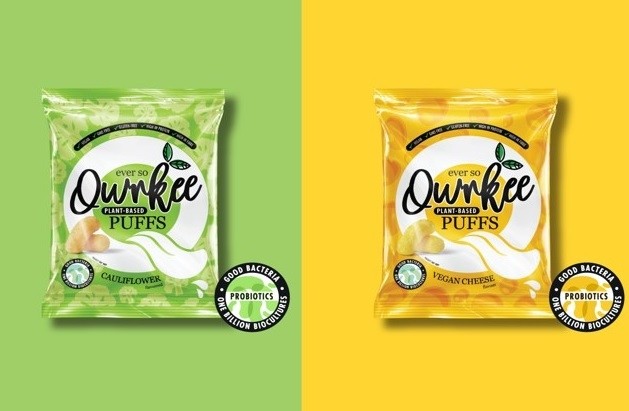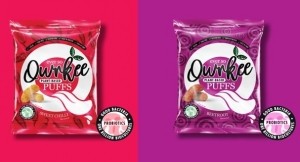Quirky idea: Startup reveals probiotic, protein and fibre-filled puffs

Qwrkee – a UK plant-based brand founded just four month ago by Vishal Madhu – is looking to capitalise on this burgeoning trend with what it is calling the world’s first probiotic snack - Probiotic Puffs.
Made up of three core ingredients – pea protein, fava beans and sorghum – the puffs' initial flavours include beetroot, cauliflower, sweet chilli and vegan cheese.
But Qwrkee wasn’t shy in experimenting with unusual tastes. Spinach and matcha, asparagus and kale, and mushroom were three of many trials that didn’t make the final cut.
“We tried tons – even brussel sprout flavour, which we’ve decided to keep as a special around Christmas,” Madhu tells Food Spark. “We’re still developing a bacon flavour, and it seems that many people want the standard salt and vinegar, so we may look into that. You have to please the mass market.”
While veg has largely driven initial flavour development, the health aspect of the puffs has also been important – with the products offering 20g of protein per 100g.
“No other puff snack gives you that,” claims Madhu. “It’s also got 10g of fibre per 100g. So when you look at the combination – the probiotics, the fibre and the protein, it’s an all-in-one offering. I don’t think there are any healthier snacks out there."
But probiotic-based snacks are not a new concept - at least not in America. Probiotic crisps hit stores in the US back in 2017, including Kraut Krisps from Farmhouse Cultures, which are made with corn and sauerkraut, while Luke’s Organic has probiotic-bolstered sprouted grain and seed tortilla chips.
The UK is a challenging market when it comes to probiotics too, seeing as they must legally be labelled as ‘cultures’.
Extreme testing
While health drove Qwrkee’s plant-based innovations, puffs weren’t originally in the plan.
“We didn’t actually set out to make puffs,” reveals Madhu. “Healthier snacking [is on the rise], with a 35% rise in demand compared to standard snacks in the market today. People are crying out for more and more healthy snacks, so we started researching the idea of a probiotic.
“Lots of nutritionists, dietitians and even doctors classify your gut as a ‘second brain’. If your gut is healthy, you will have a very healthy lifestyle, but there are many common ways – antibiotics, alcohol, and even a lack of sleep – your gut can be damaged. Probiotics help with this, but why have tablets when you can just have it in food and not have to think about it?”
Madhu says that it took around 12 months of research and development to create the final puff products, which required help from a biotech firm.
“We had the thought process, they had the know-how and the technology,” he explains. “It’s an incredibly technological product. It’s a dormant probiotic. In a normal environment at a normal temperature, there’s no risk of live bacteria running around in any factories at all. The only way it comes alive is when it hits your gut and has the appropriate levels of acidity and pH around it. That’s when it starts forming."
“Nobody has ever done this before,” he adds. “There is no probiotic that you can put into a food product that will survive at the temperature that we have to make the snack.”
As part of the puff making process, the raw ingredients are exposed to around 200 degrees of heat.
“It’s an extreme test for the product, but we managed to create one that not only survives, but also gives us about one billion bio-cultures in a 20g serving – the recommended daily allowance is two billion,” he explains.
Plant-based jerky
Probiotic Puffs aren’t the only product for Qwrkee. It is also releasing a 35g vegan jerky, previously only available in 70g packs.
Made with soy, the jerky is said to replicate its meat equivalent in both taste and texture. The production process, from dehydrating to marinating, is carried out in-house at Qwrkee.
“We follow the same process as normal jerky, but not only is it vegan, it’s better for the environment too,” says Madhu. “100g of real jerky needs 200g of meat, and it takes five to six days to dry effectively. Qwrkee uses soybeans, directly extrudes the wheat from soy, and then marinates and dehydrates the product. The entire process takes around five hours.”
According to Madhu, the protein content is 28g per 100g compared to 32g in the real deal. For that 4g sacrifice, consumers gain around 10g fibre (approximately ten times that of real jerky) as well as a huge saving on water, land and greenhouses gases, he says. Qwrkee’s vegan jerky is available in four flavours: ultra-hot chilli, black pepper, spicy BBQ and maple bacon.
To pea or not to pea
Qwrkee has also worked on a solution to another plant-based issue – nutritional milk.
“One reason that it’s so key for children to drink milk is the iodine it contains,” says Madhu. “No plant-based milk has it - 95% of the contents are water. It gives you minimal nutrition, and you can end up with an iodine deficiency if you’re not careful.”
“Qwrkee Pea M’lk has been fortified with all the good ingredients we can think of. It’s similar to whole milk in terms of its nutritional profile; it has the same protein as milk, but is lower in sugar, plus it has all the vitamins and minerals that you get from milk.”
The Pea M’lk is made with pea protein isolate, which is hydrolysised before the milk is made, removing “any kind of taste, texture and colour existing in the product” and rendering it 95% pure.
“At the stage, it disperses in water very quickly and doesn’t have much of a taste,” Madhu reveals. “There’s a slight hint of pea, which is unavoidable as it’s a natural product, but we’ve eliminated around 85% of it.”
Just getting started
Asked about future product lines, Madhu is holding his cards close to his chest, but expects to have six to seven ranges in the market by quarter one of 2020.
“We’re looking at a drink that should be out shortly, as well as a chilled product that we’ve almost nailed down,” he says.
“They’re both fantastic, but [the latter] would be an absolutely groundbreaking product. We’ve also got a couple of very interesting snacks in development at the moment. Once we’ve released all of these, we will concentrate on establishing them in the market.”
This article was originally published on www.foodspark.com, a digital subscription service designed to inspire and inform innovation across the food industry. You can request a demo here wbvahf@sbbqfcnex.pbz or call 01293 610371.





